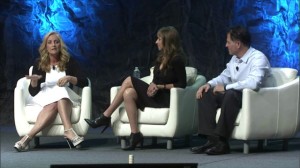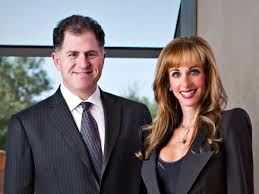By LAURA LOREK
Founder of Silicon Hills News

Alex Witt, anchor with MSNBC interviewing Susan and Michael Dell at the Dell Women’s Entrepreneur Network. Photo courtesy of Dell.
A lot of people in Austin and beyond know the story about how Michael Dell started his computer company at the age of 19 in a dorm room at the University of Texas with $1,000.
He grew the company into a multi-billion dollar international computer maker and he has recently taken it private and reinvented its focus on software, services, cloud computing and computers.
But last week 200 female CEOs from all over the world attended the Dell Women’s Entrepreneur Network conference in Austin and they got to hear about another part of Dell’s success.
Michael and Susan Dell participated in an afternoon fireside chat with Alex Witt, an anchor with MSNBC. She interviewed them about the impact of their private family foundation, which they started in 1999 with $277 million. It expanded to more than $1 billion in assets. And the foundation has given away close to $1 billion since its inception.
The Michael & Susan Dell Foundation focuses on urban education, childhood health and family economic stability. The foundation expanded its grants and programs to India in 2006 and Africa in 2010.
Helping Families in Urban Food Deserts
Susan Dell mentioned how difficult it can be for moms in urban settings in the U.S. to find fresh fruit and vegetables for their kids. She called them urban food deserts. She recounted a story about one mom who rode a bus two hours to get to a farmer’s market to buy fresh produce for her family. The mom convinced the farmers to set up a market at her children’s school, Dell said.
“These stories are important to share,” she said.
They illustrate how people can make a difference. She also said her foundation published a series of Be Well books aimed at moms with little resources in urban areas to help them lead healthier lifestyles. The books feature stories of moms who are creatively finding ways to fight childhood obesity in their homes and communities.
“It’s not that they don’t want healthy foods, it’s that it’s not available,” she said.
“If you’re a person who is living in an urban setting you find yourself with not as many options and you’ve got to get creative,” Susan Dell said.
Some of the moms took back a park and did neighborhood patrols to make sure it was safe for their kids to exercise and play, Dell said.

Michael and Susan Dell, photo courtesy of their family foundation.
Susan and Michael Dell are the parents of four children and they know the challenges parents face in limiting screen time for their children and getting their kids to eat right and exercise.
“We limit screen time in our household,” Susan Dell said.
Other simple changes like not buying sugary drinks or junk food, putting out fresh fruits and vegetables as snacks, broiling and steaming foods, instead of frying, can make a huge difference, Dell said.
The Michael & Susan Dell Foundation Focus on Education
Witt asked Michael Dell how the foundation chooses the programs it wants to work on in the education area.
“We worked with individual schools, districts and the state level,” Michael Dell said.
But in running the foundation, he found there was very little data available to assess the effectiveness of programs. And the data varied vastly from school to school so there was no way to compare the data. So the foundation created Ed-Fi Alliance in 2012, a nonprofit startup focused on data collection in schools. And now it’s in half of the nation’s school districts.
“The foundation had a baby and it’s called the Ed-Fi Alliance,” he said.
The goal was to give teachers more information and enable better outcomes for students.
Dell has also established the Dell Scholars program nationwide. It has helped 2,500 Dell Scholars from underprivileged backgrounds. They have an 85 percent college graduation rate, compared to a 20 percent average for kids in the same socio-economic circumstances, Susan Dell said.
The key to the success is Dell also provides wraparound services to support the students, which includes everything from money for incidental expenses like clothes and laundry.
“These students are coming from very challenging backgrounds,” she said. “They have the ability to study hard and do well but they don’t have what it takes to get beyond these obstacles.”
Susan Dell about the success of one young woman, a Dell Scholar, who came from a family of six with an annual income of $21,500. The woman graduated from UT, went to Teach for America and then got a job with Goldman Sachs.
She recently quit because she’s going to graduate school at Harvard.
“Every once in awhile we can put a face to what we’re doing,” Susan Dell said.
The key to funding successful programs is to ask a lot of questions and get to the root cause of the problem and to have an understanding about what the problem is, Susan Dell said.
 And sometimes programs simply don’t work out. The Michael & Susan Dell Foundation recently published a website: LessonsEarned.org to share their successes and failures with others in hopes they can learn from them.
And sometimes programs simply don’t work out. The Michael & Susan Dell Foundation recently published a website: LessonsEarned.org to share their successes and failures with others in hopes they can learn from them.
When Michael Dell invests in a country, he looks for an opportunity for progress and a stable and progressive government.
“If they don’t want to change, it’s pretty hard to convince them to change,” he said. “We also start with a baseline of data. What’s going on here and what’s the opportunity? What kind of progress can occur?”
The work requires patience and perseverance, Michael Dell said.
“You have to operate in a local context – understand the local rules, customs and the motivations of the individuals involved you are trying to impact in some way,” he said. “If we are not welcome there, we tend to go somewhere else.”
Government involvement is key to a program working in any country, he said.
“It’s important to recognize that governments have fairly enormous resources – far more than private foundations,” Michael Dell said. “And so one of the things private foundations can do is catalyze the spending or the activity of the government in a constructive way.”
The key to the success of the Michael & Susan Dell Foundation is its focus on children, Susan Dell said.
“You cannot do everything, but if you focus then you can make an impact with your work,” she said. “If you want to think about how you can change the world for the better, for us, we think that starting with the world’s children is a good place.”

